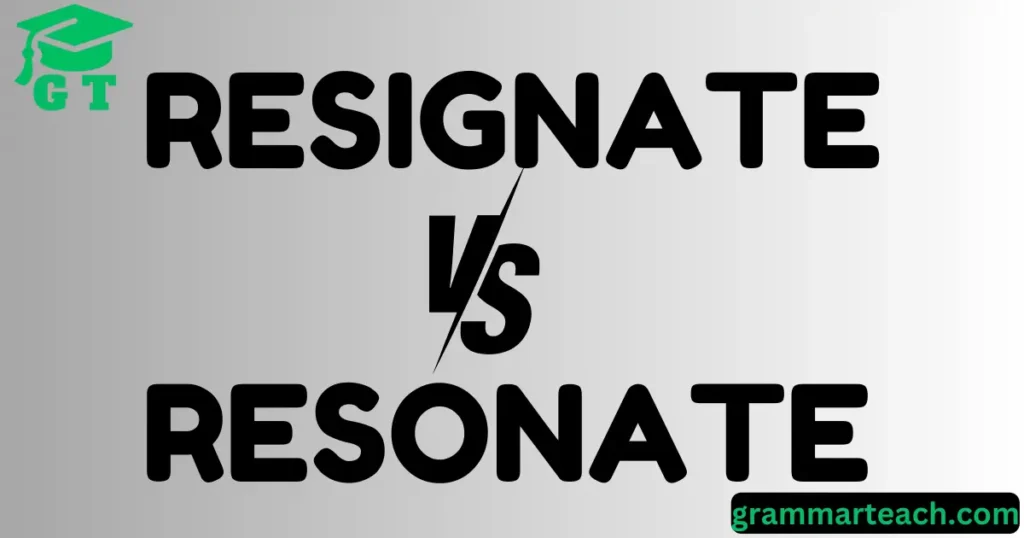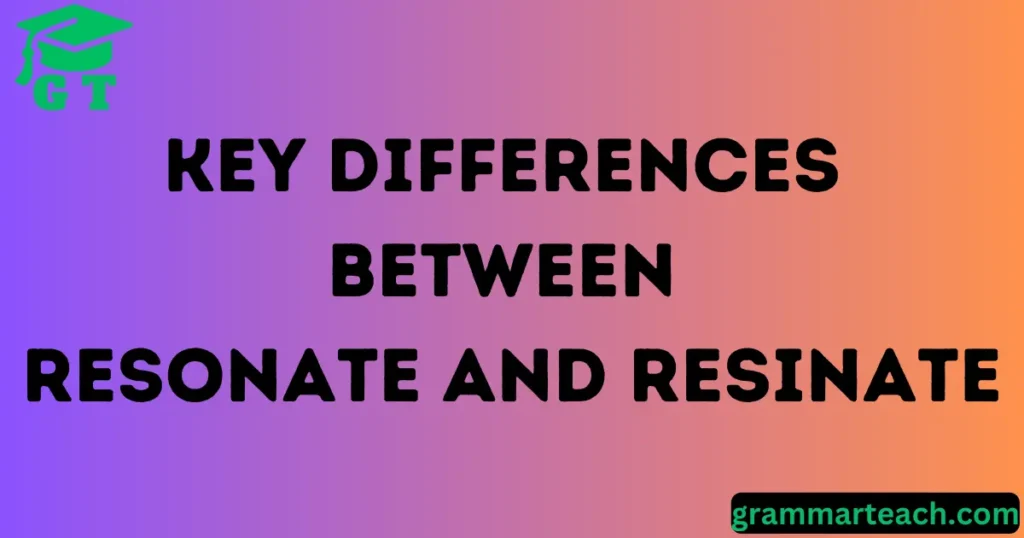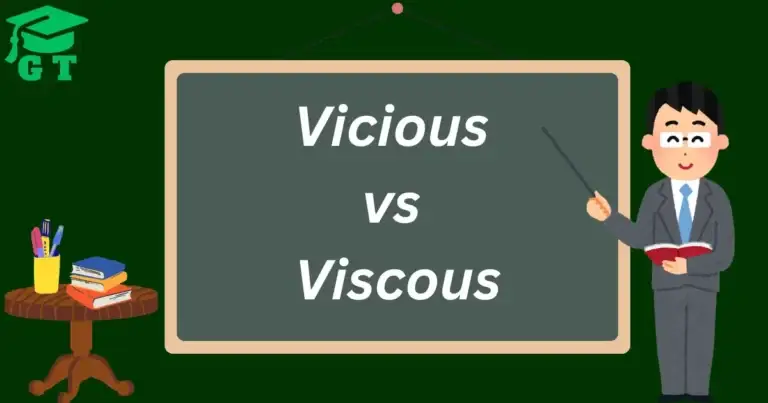Have you ever heard someone say “resignate or resonate” and wondered which one is correct? Or have you seen “resonate” and thought it meant something different? Many people get confused between these words because they sound alike. But did you know that “resignate” is not a real word? Despite its frequent usage in casual speech, it does not appear in any reputable dictionaries or linguistic sources. However, its similarity to both “resonate” and “resign” leads to common misunderstandings.
This article will clarify the difference between “resonate” and “resinate,” explain why “resignate” is incorrect, and help you confidently use the right word in your writing and speech. You’ll also learn about the origins of these words, how they function in different contexts, and tips for avoiding mistakes.
By the end, you’ll have a thorough understanding of these words and feel more confident using them in everyday conversations and professional writing!
Resignate vs. Resonate: What’s the Difference?

What is “Resignate”?
🚫 Incorrect word!
- Definition: “Resignate” is a commonly mistaken word that does not exist in standard English. It is often misused in place of “resonate.” Many people believe it is a sophisticated or technical term, but it has never been officially recognized in dictionaries or linguistic resources. Despite its frequent appearance in casual speech and informal writing, “resignate” remains an incorrect and improper word choice.
- Origin: The mistaken term “resignate” likely stems from a blending of “resign” and “resonate.” Because “resign” (which means to step down from a position or accept something reluctantly) shares phonetic similarities with “resonate,” people sometimes assume “resignate” is a logical variation. However, this assumption is incorrect, as there is no historical or grammatical basis for its usage.
- Common Mistake: People often think “resignate” is a valid alternative to “resonate” or even “resign.” This misunderstanding can lead to errors in both spoken and written communication. Using “resignate” in formal writing or professional contexts can make a statement seem less credible, so it is crucial to recognize that the correct term is “resonate.”
What is “Resonate”?
✅ Correct word!
- Definition: “Resonate” means to produce a deep, full sound or to have a lasting emotional or intellectual impact. It can also refer to an idea or feeling that strongly connects with someone on a personal or cultural level.
- Origin: Derived from the Latin word resonare, meaning “to resound.” Over time, it has expanded beyond its original acoustic meaning to describe emotional and intellectual connections.
- Usage in Sentences:
- “Her speech resonated with the audience, inspiring them and sparking a meaningful discussion.”
- “The violin’s strings resonated beautifully in the concert hall, filling the space with a rich melody.”
- “His words resonated deeply with those who had experienced similar struggles.”
- Contextual Usage:
- Commonly used in music, literature, psychology, and emotional discussions.
- Often describes how ideas, messages, or emotions deeply affect someone or leave a lasting impact.
- Used metaphorically to express the widespread influence of a thought, concept, or sound.
What is “Resinate”?
✅ Correct word, but different meaning!
- Definition: “Resinate” means to treat or infuse with resin (a sticky organic substance from trees or synthetic materials). It refers to a process often used to enhance durability, water resistance, or aesthetic quality in various materials. The term is primarily applied in manufacturing, art preservation, and chemical industries.
- Origin: Comes from “resin,” which refers to natural or artificial substances used in preservation, production, and craftsmanship. The verb form “resinate” derives from this noun, indicating the act of coating or impregnating a material with resin.
- Usage in Sentences:
- “The artist resinated the sculpture to protect it from weather damage and give it a glossy finish.”
- “Manufacturers resinate certain fabrics to increase durability and resistance to wear and tear.”
- “The woodworker carefully resinated the surface of the table to enhance its longevity and prevent moisture damage.”
- Contextual Usage:
- Found in industries like woodworking, art restoration, preservation, and chemistry.
- Used when describing the process of applying resin to surfaces for protection, strengthening, or aesthetic purposes.
- Common in contexts where sealing, laminating, or reinforcing materials is necessary for structural integrity or artistic enhancement.
Read More: Meaning of WTW: What It Stands For & How to Use It
Key Differences Between Resonate and Resinate

| Aspect | Resonate | Resinate |
| Definition | To create sound or have an emotional impact | To treat something with resin |
| Common Usage | Music, speeches, emotions | Chemistry, woodworking, art |
| Context | Everyday conversations, writing | Science, manufacturing |
| Grammar Role | Verb | Verb/Noun |
| Common Mistakes | Confused with “resinate” | Used instead of “resonate” |
Example Scenarios to Illustrate the Difference
Scenario 1:
- “The singer’s voice resonated through the hall, giving everyone chills.”
- ❌ Incorrect: “The singer’s voice resignated through the hall.”
Scenario 2:
- “The carpenter resinated the furniture to protect it.”
- ❌ Incorrect: “The carpenter resonated the furniture.”
Why Do People Confuse Resonate, Resignate, and Resinate?
🔹 Similar Pronunciation: These words sound alike, leading to mix-ups.
🔹 Lack of Awareness: “Resignate” seems real, but it isn’t!
🔹 Technical vs. Common Usage: “Resinate” is used in science, while “resonate” is used in everyday speech.
Synonyms & Antonyms
| Word | Synonyms | Antonyms |
| Resonate | Echo, reverberate, impact | Dampen, muffle, weaken |
| Resinate | Treat with resin, coat, seal | Expose, strip, remove |
Which One Should You Use? (Easy Memory Tricks!)
✅ Use “resonate” when talking about sounds, emotions, and impact.
- 🎵 Music resonates.
- 📝 Words resonate with people.
✅ Use “resinate” when talking about treating materials with resin.
- 🏗️ Resinate wood for protection.
- 🎨 Artists resinate paintings to preserve them.
🚫 Never use “resignate.” It is NOT a real word!
Read More: Purposed vs Proposed: Key Differences & Correct Usage
Final Thoughts
Understanding the distinctions between “resonate,” “resinate,” and the incorrect term “resignate” is essential for clear and precise communication. “Resonate” is the correct choice when referring to sound or emotional impact, while “resinate” is reserved for treating materials with resin. “Resignate” should never be used, as it is not recognized in proper English.
By using these words correctly, you can enhance both your written and spoken communication. Whether discussing music, emotions, or industrial treatments, choosing the right term ensures clarity and professionalism. Now, go forth and use these words with confidence.




